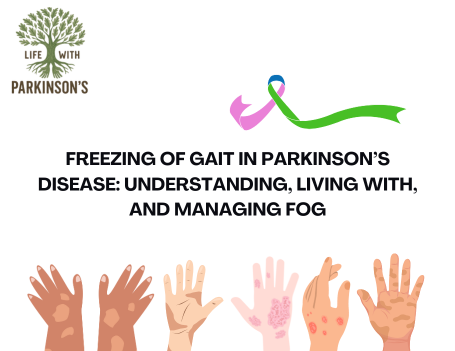Hi, it’s David and Hayley from Life with Parkinson’s. If you’re new here, welcome — we’re glad you found us. And to those of you who have been following along, thank you for your continued love and support. (Kiwi says hello too!)
In this post, we’re diving into a topic that affects so many of us living with Parkinson’s: stress and anxiety. We’ll be looking at it from both sides — my perspective as someone with Parkinson’s, and Hayley’s perspective as a caregiver.
When Stress Blocks the Path Forward
I’m sure a lot of other people with Parkinson’s out there have a similar issue: when I’m stressed or anxious, I find it really hard to think clearly and process it through my mind. When I’m “on,” I can deal with stress and anxiety in a more normal way.
For example, let’s say I’m trying to get out for a walk. This doesn’t happen every day or even every week, but once or twice a month I’ll find myself in this situation. I want to go for my walk, but I just can’t. And that’s frustrating, because going for a walk is basically my medicine. It calms me down. I need that walk for my quiet time, for my endorphins, for my ability to reset.
But here’s the hard part: when I’m too stressed to go out, I miss the very thing that helps me manage my stress. It’s an oxymoron — being too anxious to do the one thing that eases my anxiety. The more worked up I get, the less chance I have of getting out that day. That cycle is very frustrating.
In the last year or so, stress has piled up. We’ve had some tough seasons, and those pressures don’t just go away. When it gets too overwhelming, my body seems to store all that stress, and eventually it comes out through my jaw. Those jaw attacks are painful and very hard to deal with.
What makes it worse is the anxiety leading up to them. I’ll often feel it building and think, “Oh no, it’s going to come.” That worry alone ramps up the stress. Sometimes it happens at night when there’s nothing I can do — the banks are closed, the problems can’t be solved in that moment. I end up caught in a loop of stress about stress. We’ve talked about it, and the best reminder I have is this: if it’s urgent, I can deal with it tomorrow.
Caregiver Perspective: Reassurance Matters
When I get overwhelmed and feel like something has to be dealt with right away, Hayley reminds me that it doesn’t always have to be done in the moment. Logically, she’s right — many things can wait until tomorrow.
What helps me most is her calm reassurance. She says things like:
“Nothing can happen right now — it’s okay to wait.”
“You’ve been heard, and we’ll deal with it when you’re back on.”
Hearing that actually helps me relax. Even if I don’t believe it right away, just listening to her makes a difference.
Hayley also makes sure I can talk about how I feel, even if what I’m saying is sad, confusing, or doesn’t make complete sense. She doesn’t shut me down — she validates my emotions and reminds me that how I feel matters. She lets me have my “pity party” and then reassures me that we can handle things later.
Because of my mild cognitive impairment, when I’m “off,” I don’t always think clearly. I can’t control where my thoughts go, and sometimes I bring up really intense topics at the wrong time. Hayley helps by calmly saying, “Not right now,” and guiding me away from stress that could trigger symptoms. That validation and reassurance make a huge difference in my life.
Role Changes and Shared Responsibilities
Before Parkinson’s, I took care of all the finances. I was working, and Hayley was busy raising the kids, so it just made sense. But now, things have shifted. I’ve had to accept that managing money is overwhelming for me and can even trigger my symptoms.
So Hayley has stepped in to share that responsibility. At first, it wasn’t easy for her — she’s never been confident with math and was worried about making mistakes. But she took it on anyway, and now we share the load together.
We also put safeguards in place for both our peace of mind:
- I don’t take money out of the bank account without her knowing.
- We go over finances together so it’s not too much for either of us.
- These steps prevent stress and anxiety that could otherwise spiral into symptoms.
This wasn’t something Hayley forced on me — I brought it up myself because I know when I’m “off,” I can’t always think clearly. Having these rules makes me feel safer and calmer.
It’s a big change from how things used to be, but sharing responsibilities and setting limits has become necessary. It helps protect us both.
Setting Friends and Family Up for Success
Stress doesn’t just come from finances or inside the home — it can show up in social situations too. Because of my medication cycles, there are certain times of day when I just can’t handle company. But that doesn’t mean I don’t want to see people. In fact, I really need those connections so I don’t feel lonely or isolated.
That’s why we’ve started letting friends and family know the best times to visit or call. It’s not about pushing people away — it’s about setting everyone up for success.
Our kids, parents, and even close friends plan around my “on” times now. For example, instead of stopping by when I’m off, they’ll arrange visits when I’m more able to engage and enjoy their company. This small adjustment turns what could be a stressful interaction into something uplifting.
I like to think of it as giving people a guide: “Here’s the time that works best for me, so we can actually enjoy each other’s company.” That way, social time becomes positive instead of a trigger for symptoms.
Final Thoughts
Living with Parkinson’s has changed how we deal with stress and anxiety. For me, reassurance, safeguards, and timing are essential. For Hayley, it’s about patience, validation, and stepping into roles she never expected.
Together, we’re learning to manage it — not perfectly, but in ways that keep us balanced. If you’re on a similar path, I hope our experience helps you feel less alone.
Thank you for listening to what we deal with day-to-day. Please share your own experiences in the comments — we’d love to hear from you.
And Kiwi says, “Have a good day!” 🐦
Support My Journey
If you’ve found value in what I share here and would like to support my journey, I’d be truly grateful if you considered supporting me through Ko-fi. Every contribution — no matter the size — helps me keep this blog going, cover research costs, and continue sharing my experiences openly and honestly. It also allows me to create more free content and respond to the many comments and messages I receive from others in the Parkinson’s community.
If you’re not able to contribute financially, that’s okay — simply sharing these posts, leaving a comment, or letting someone else with Parkinson’s know they’re not alone means the world to me.
A Note from Me
I never imagined I’d be sharing so much of my personal life online, but I’ve found that being open not only helps me, it also connects me to so many of you who are going through similar struggles. That connection means more than I can put into words. If what I share helps even one person feel understood or less alone, then it’s worth every effort.
Caregiver’s Corner
I couldn’t do this without Hayley. Her patience, reassurance, and ability to help me when I’m “off” makes a world of difference. Caregivers often don’t get the credit they deserve, but their role is just as important as the person living with the condition. If you’re a caregiver reading this, know that what you do matters deeply. And if you’re someone with Parkinson’s, don’t be afraid to lean on the people who love you — they want to help.
Medical Disclaimer
I’m not a doctor. Everything I share here is based on my personal experience with Parkinson’s and how Hayley and I manage the challenges that come with it. Please don’t take what I say as medical advice. Always consult your neurologist or healthcare professional before making changes to your treatment, supplements, or lifestyle.




